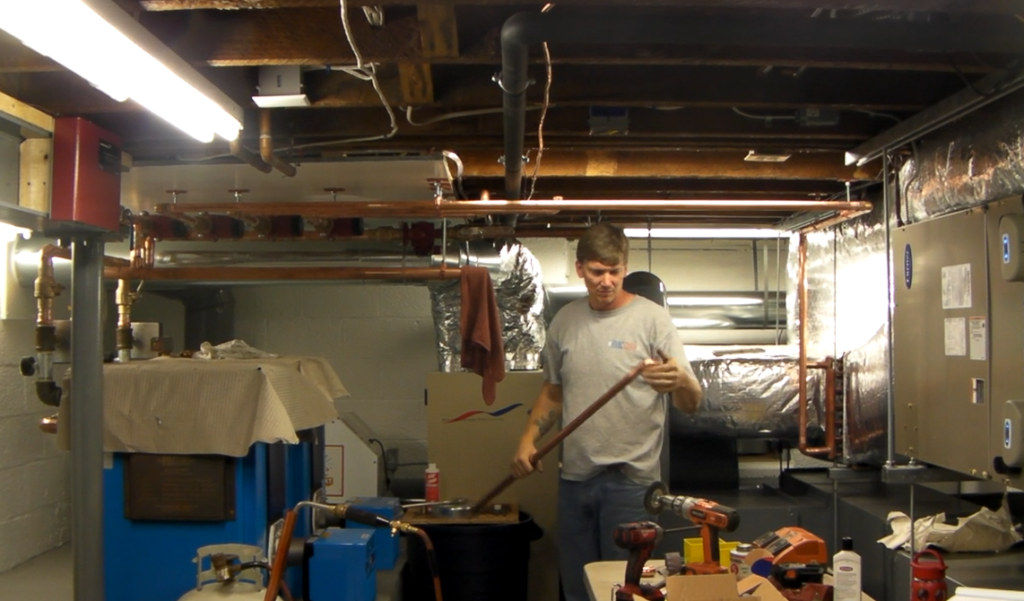[et_pb_section admin_label=”section”][et_pb_row admin_label=”row”][et_pb_column type=”4_4″][et_pb_text admin_label=”Meaning of HVAC” background_layout=”light” text_orientation=”left” use_border_color=”off” border_color=”#ffffff” border_style=”solid”]
This post is to inform building owners of the meaning behind the term “HVAC.”
“HVAC” is pronounced: “H” “VAC” – this is not understood by most, and for good reasons, given the complex breadth of the mechanical contracting trade.
A building may, or may not include Heating, Ventilating, or Air Conditioning (HVAC) systems. Of course, most buildings – residential and commercial – do include a heating system, which is essential in most of these United States. But most owners of heating systems do not know what type of heating system theirs is. So, here is a brief categorical breakdown.
H-V-A-C is broken down, as follows…
[/et_pb_text][et_pb_divider admin_label=”Red Divider” color=”#ab1e2e” show_divider=”on” divider_style=”solid” divider_position=”top” hide_on_mobile=”on” height=”5″] [/et_pb_divider][et_pb_text admin_label=”Heating Definition” background_layout=”light” text_orientation=”left” use_border_color=”off” border_color=”#ffffff” border_style=”solid”]
Heating
Heating System Types Include:
Gravity Hot Water (GHW) – Rare
Forced Hot Water (FHW)
Gravity Hot Air (GHA) (no fan/blower) – Rare
Forced Hot Air (FHA) (with fan/blower)
Steam
Heat-Generating Equipment (equipment that converts fuel/energy to heat)
Furnaces
Space Heaters
Boilers
Water Heaters
Heat Pumps
Resistive Heaters
Fireplaces
Stoves
The Sun – Passive Solar – Glass Thermal Units
Terminal Units (equipment that emits heat that is generated by types of heating systems described above)
Steel & Cast Iron Radiators
Baseboard Convectors – Copper Fin Tube
Baseboard Convectors (Radiant) – Cast Iron
Panel Radiators (Convectors) – Steel
Fan Convectors (Hot water coil & Fan)
Air Handlers (Hot water coil and blower)
Radiant Panels (floor; ceiling; wall)
Burners (associated with heating)
Rotary-Type – (rare)
Gun-Type
Atmospheric-Type
Pot-Type (rare)
Electric Resistive
Fuels (associated with heating)
#2 Fuel Oil
#6 Bunker Fuel
Waste Oils (typically, automotive and cooking oil)
Kerosene
Propane (LPG)
Natural Gas (NG)
Butane
Methane (fossil fuel-based and “other”)
Chord Wood
Wood Pellets
Bio Fuel (manufactured and derived from plants)
Coal
Electricity
[/et_pb_text][et_pb_text admin_label=”Text” background_layout=”light” text_orientation=”left” use_border_color=”off” border_color=”#ffffff” border_style=”solid”]
Here in New Hampshire, every building – intended to be occupied by humans in winter – has some type of heating system, but not all are “central heat” systems.
If/when you have a heating “emergency,” it will be helpful when you call an HVAC contractor/service company (in New Hampshire) to explain to them:
- What type of heating system you have.
- What type of fuel/gas your heating system utilizes.
- What the nature of your heating service issue is.
Happy heating!
[/et_pb_text][et_pb_divider admin_label=”Red Divider” color=”#ab1e2e” show_divider=”on” divider_style=”solid” divider_position=”top” hide_on_mobile=”on” height=”5″] [/et_pb_divider][et_pb_image admin_label=”Image” src=”https://www.protechhvac.com/wp-content/uploads/2017/01/wasag-side-view1-200dpi.jpg” alt=”A Radiant Heating System – designed and installed by John Rocheleau, in 1996″ title_text=”A Radiant Heating System – designed and installed by John Rocheleau, in 1996″ show_in_lightbox=”off” url_new_window=”off” use_overlay=”off” animation=”top” sticky=”off” align=”center” force_fullwidth=”off” always_center_on_mobile=”on” use_border_color=”off” border_color=”#ffffff” border_style=”solid” /][et_pb_divider admin_label=”Red Divider” color=”#ab1e2e” show_divider=”on” divider_style=”solid” divider_position=”top” hide_on_mobile=”on” height=”5″] [/et_pb_divider][et_pb_text admin_label=”Ventilating Definition” background_layout=”light” text_orientation=”left” use_border_color=”off” border_color=”#ffffff” border_style=”solid”]
Ventilating
Ventilation Systems Types Include:
Heat Recovery Ventilators (HRV)
Energy Recovery Ventilators (ERV)
Non-Heat Exchange Ventilators
[/et_pb_text][et_pb_divider admin_label=”Red Divider” color=”#ab1e2e” show_divider=”on” divider_style=”solid” divider_position=”top” hide_on_mobile=”on” height=”5″] [/et_pb_divider][et_pb_image admin_label=”Carrier HRV Image” src=”https://www.protechhvac.com/wp-content/uploads/2017/02/Resized-IMG_6318.jpg” alt=”Carrier HRV Ventilator” title_text=”Carrier HRV Ventilator” show_in_lightbox=”off” url_new_window=”off” use_overlay=”off” animation=”top” sticky=”off” align=”center” force_fullwidth=”off” always_center_on_mobile=”on” use_border_color=”off” border_color=”#ffffff” border_style=”solid” /][et_pb_divider admin_label=”Red Divider” color=”#ab1e2e” show_divider=”on” divider_style=”solid” divider_position=”top” hide_on_mobile=”on” height=”5″] [/et_pb_divider][et_pb_text admin_label=”Air Conditioning Definition” background_layout=”light” text_orientation=”left” use_border_color=”off” border_color=”#ffffff” border_style=”solid”]
Air Conditioning
Air Conditioning Systems Types Include:
- Central
- Ductless – “Mini Split”
- Swamp Coolers
[/et_pb_text][et_pb_divider admin_label=”Red Divider” color=”#ab1e2e” show_divider=”on” divider_style=”solid” divider_position=”top” hide_on_mobile=”on” height=”5″] [/et_pb_divider][et_pb_image admin_label=”Carrier 5-Ton Infinity Condensers Image” src=”https://www.protechhvac.com/wp-content/uploads/2017/02/SANY0026.jpg” alt=”Carrier 5-Ton Infinity Condensers” title_text=”Carrier 5-Ton Infinity Condensers” show_in_lightbox=”off” url_new_window=”off” use_overlay=”off” animation=”top” sticky=”off” align=”center” force_fullwidth=”off” always_center_on_mobile=”on” use_border_color=”off” border_color=”#ffffff” border_style=”solid” /][et_pb_divider admin_label=”Red Divider” color=”#ab1e2e” show_divider=”on” divider_style=”solid” divider_position=”top” hide_on_mobile=”on” height=”5″] [/et_pb_divider][et_pb_text admin_label=”ICC & Mechanical Text” background_layout=”light” text_orientation=”left” use_border_color=”off” border_color=”#ffffff” border_style=”solid”]
What is “Indoor Climate Control?”
Indoor Climate Control (ICC) includes all equipment and systems that affect the Temperature; Air Quality; and Humidity of a space, and includes “HVAC” systems, as previously described. HVAC and ICC are often grouped together under the heading, “Mechanical Contracting.” Mechanical Systems also include Fuel Tanks & Piping; Ducting; Fossil Fuel Venting; Kitchen Exhaust & Make-up Air (MUA); Combustion Air Supply (CAS); Snow- & Ice-Melting Systems; Pool Heating and Potable Water Heating; Fire Sprinkler/Suppression Systems… and this list is not even complete!
No wonder building owners are generally ill-informed about the meaning of HVAC; I can’t even recite it completely, and I have 37 years in the trade!
[/et_pb_text][et_pb_divider admin_label=”Red Divider” color=”#ab1e2e” show_divider=”on” divider_style=”solid” divider_position=”top” hide_on_mobile=”on” height=”5″] [/et_pb_divider][et_pb_image admin_label=”ERV, Make-up Air, Kitchen Exhaust & Packaged Heat/Cool RTU installed by John Rocheleau Image” src=”https://www.protechhvac.com/wp-content/uploads/2017/01/dsc00005-1.jpg” alt=”ERV, Make-up Air, Kitchen Exhaust & Packaged Heat/Cool RTU installed by John Rocheleau” title_text=”ERV, Make-up Air, Kitchen Exhaust & Packaged Heat/Cool RTU installed by John Rocheleau” show_in_lightbox=”off” url_new_window=”off” use_overlay=”off” animation=”top” sticky=”off” align=”center” force_fullwidth=”off” always_center_on_mobile=”on” use_border_color=”off” border_color=”#ffffff” border_style=”solid” /][/et_pb_column][/et_pb_row][/et_pb_section]

